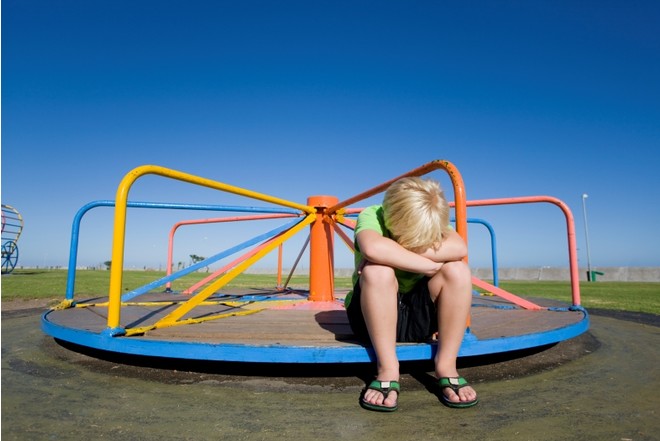Psychologists say that going with easecontact is talent. Well, or work. Which need to be engaged since the childhood. Of course, the child will not work on himself: he just does not understand why no one wants to be friends with him and what to do with it. Your task is to help him cope with this situation. Teach to be friends. Photo: GettyImages
Photo: GettyImages
Shyness is inherited
You often sigh that you were like that in your childhood.very shy and withdrawn? Yes, perhaps these traits were passed on to you by your genes. After all, temperament plays a big role – and this is an innate thing, determined by the characteristics of the nervous system. But any temperament can be “tuned”, forming a character. Take the child with his shyness by the hand, go to other kids, help him get acquainted. Offer some simple game, start playing together. Is there contact? Now quietly step aside – let them continue on their own. They will figure it out. And everything will be fine.
Intervene right
If you're wondering whether you should get involved at allthe child's relationship with peers, don't doubt it. It's worth it. But intervention is not the same as intervention. For example, if your son is not included in a game on the basketball court, you shouldn't go up to him and tell him to join the team. This will further undermine the child's authority ("What, are you going to run to mommy?"). And medical psychologist Elena Nikolaeva told the editors of Woman's Day how to help without causing harm. — It’s better to start teaching children communication skills fromfrom the earliest age. Teach your child to get acquainted. Simple formulas: “Hi, I'm Sasha. What's your name? Let's play together” or “I'm Olya. Can I play with you?” will help the child overcome embarrassment and join in a joint game. Then it will be much easier for him to establish contacts with peers in kindergarten and school. The next step is compliments. This is the easiest way to keep the conversation going. “Katya, you have such a beautiful dress” or “You draw so beautifully!” - anything, as long as it is sincere.
— It’s better to start teaching children communication skills fromfrom the earliest age. Teach your child to get acquainted. Simple formulas: “Hi, I'm Sasha. What's your name? Let's play together” or “I'm Olya. Can I play with you?” will help the child overcome embarrassment and join in a joint game. Then it will be much easier for him to establish contacts with peers in kindergarten and school. The next step is compliments. This is the easiest way to keep the conversation going. “Katya, you have such a beautiful dress” or “You draw so beautifully!” - anything, as long as it is sincere.
Do not have a hundred rubles ...
To have a lot of friends, you need to have, like thiscynical as it may sound, it is a good choice. The child should be around peers more often. And it is up to you whether he will have this opportunity. What can be done? - allow him to invite peers to his home and go to visit himself; - organize a fun children's party or gather everyone at the child's birthday; - invite your friends with children to visit more often (those who have children of approximately the same age as your child); - enroll the child in a sports section or any other club according to his interests. In addition, it is important to teach the baby not only to speak, but also to listen. Elena Nikolaeva, medical psychologist - He should be able to listen to what the other is sayingman, to ask leading questions, to lay the connection between what he said before and what he says now. Do not forget to praise the child if you see his progress. “I see that you and Sasha together built the castle. You had fun! ”
- He should be able to listen to what the other is sayingman, to ask leading questions, to lay the connection between what he said before and what he says now. Do not forget to praise the child if you see his progress. “I see that you and Sasha together built the castle. You had fun! ”
Let's start with the sandbox
Yes, playing in the yard is important.There is a "sand" observation that shows how children join the general game. It turns out that the kids who immediately climbed into the very center of the sandbox and tried to take the lead, met with resistance from other children. A conflict ensued. The children who stood at the edge of the sandbox remained unnoticed. Success was achieved by those children who first looked around, settled down at the edge, repeated what the others did, and gradually moved towards the middle of the group. Gradually, they found themselves in the center and felt great there. It turns out that a child must be careful and be able to adapt to the situation, on the one hand, and be persistent enough, be able to cope with emerging difficulties, on the other. Psychologist Elena Nikolaeva: — Teach your child to control their emotions.Explain that we all experience a variety of feelings from time to time, and this is normal, they arise beyond our will. But we can control their manifestations. Therefore, if someone took your toy, there is no need to fight and scream, it is enough to say: “This is my toy, and I play with it, if you want too, you can ask. I get angry when someone takes my toy without permission.” And no matter how strong your desire to find a friend for your child, remember: the ability to be friends, and just to communicate, does not come immediately. Therefore, do not rush the child, let him accumulate social skills at a pace convenient for him. Share your positive thoughts and feelings with your child. Show by your own example how to find good in any situation, and joy - in a mere trifle.
— Teach your child to control their emotions.Explain that we all experience a variety of feelings from time to time, and this is normal, they arise beyond our will. But we can control their manifestations. Therefore, if someone took your toy, there is no need to fight and scream, it is enough to say: “This is my toy, and I play with it, if you want too, you can ask. I get angry when someone takes my toy without permission.” And no matter how strong your desire to find a friend for your child, remember: the ability to be friends, and just to communicate, does not come immediately. Therefore, do not rush the child, let him accumulate social skills at a pace convenient for him. Share your positive thoughts and feelings with your child. Show by your own example how to find good in any situation, and joy - in a mere trifle.









